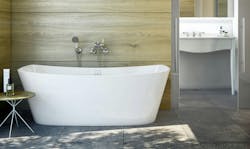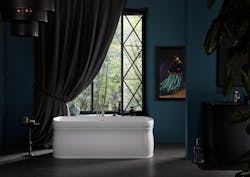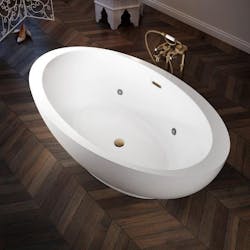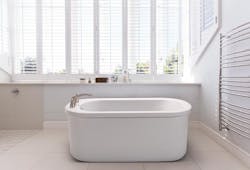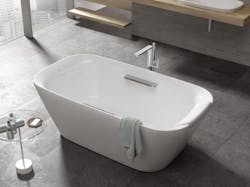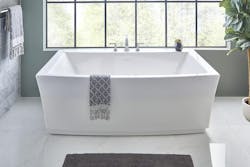The bathing experience in the master bathroom has undergone a massive shift over the past few years, as tub/shower setups have given way to large, custom showers and, increasingly, freestanding tubs. Each provides a high-end aesthetic feel as well as customized, luxurious bathing to suit homeowners’ moods and needs.
“Freestanding tubs continue to grow in popularity,” says Michael Kornowa, director of marketing for MTI Baths. “They’re beautiful. In some cases … people are putting them in even though they rarely take baths because they want it as the centerpiece of the master.”
The Chess freestanding tub is simple and minimalist, an homage to Shaker design softened by gentle, curving lines. The unit measures 65 inches by 30 inches and features a center toe-tap drain. It’s made with easy-to-clean Lithocast resin that allows for crisp, hand-finished detail.
In addition to their outright beauty, “freestanding tubs are popular because they allow tremendous latitude in placement and creativity,” Kornowa notes. “You’re not confined to an alcove. Where you put it is only limited by the creativity of the designer and the desire of the client.”
And “designs are getting more streamlined,” says Jean-Jacques L’Henaff, vice president of design for Lixil Water Technology America, parent of American Standard and DXV. He notes that trends are shifting toward cleaner lines, and products are becoming more authentic on both the traditional and modern sides.
The Opalia collection of baths features an oval inner shell that can be centered, off-center to either side, or oblique from the center, creating a play of elliptical shapes and distinctive decks, the company says. The tub measures 68 inches by 39 inches by 25 inches and can accommodate two bathers. Hydrotherapy, aromatherapy, chromatherapy, and thermotherapy options are available.
Freestanding units are getting more sculptural, says Emma Joyce, communications manager for Victoria + Albert. Joyce is seeing a shift toward transitional styles with a modern approach. For example, the company’s Trivento model is a modern take on the boat bath, with a cubic form that nods to the traditional with its elegant, symmetrical double-ended design. Transitional styling also is coming through in the pairing of modern tubs with traditional brassware or other mixing-and-matching.
Consumers are getting more adventurous with color, too, Joyce adds; in response, V + A launched six exterior paint finishes from matte white to black and is looking to extend those offerings. Indeed, options are important, says Dawn Jastrow, senior product manager for Kohler Bathing, as buyers increasingly want to make the space their own.
The MTI Basics model MBXFSX5832 offers an integrated tub deck for a Roman tub faucet and an above-floor rough-in for installation on a slab and easy renovations. A quick-drain connection is optional. It boasts a compact size of 58 inches by 32 inches and is value-priced, the company says.
And don’t neglect features, as consumers still expect their products—no matter the price point—to have them. “They’re aspirational pieces,” Jastrow says of the company’s recent introductions. “They need to be beautiful, but also they’re designed for ergonomics in bathing, which can get glossed over. Lumbar support, ample bathing wells. [They’re an] art piece that also enhances relaxation for the user.”
While freestanding tubs have become centerpieces of large master baths, the introduction of smaller models is expanding the trend to smaller spaces as well. In fact, some can now fit into the same area as an alcove tub.
At 70 7⁄8 inches by 37 3/8 inches by 23 5⁄8 inches with an 81-gallon capacity, the Neorest freestanding tub is sized for deep soaking, yet offers a compact form to maximize bathroom space. It includes a fl ush drain and push button, a slip-resistant surface, a removable waterproof pillow, and brass grab bars.
American Standard’s Townsend three-sided tub allows for installation against the wall to save space. MTI continues to expand its Designer Collection, which features a sculpted finish that allows for a seamless enclosure on one, two, three, or four sides for ultimate flexibility.
In addition, “I think ... they’re going to see higher-end styles at more affordable pricing,” says Phil Cunningham, vice president of marketing for Mansfield Plumbing.
The company has expanded its Townsend collection with a three-sided freestanding bathtub that can be installed against the wall to save space. The tub, which is made with high-quality acrylic, can be used with a fl oor- or deck-mount tub filler and features a wide deck ledge.
TRADITION REMAINS
Despite their growth, freestanding tubs still make up a small portion of the market. Drop-in tubs are still prevalent, particularly for secondary bathrooms. Among those, Jastrow is seeing a preference for minimal, clean design.
Drop-ins allow for complete flexibility of the luxury experience, as jets, airbaths, audio, visual, and other therapeutic options aren’t as widespread among freestanding offerings.
Whether a soaker, a jetted tub, an airbath, or a combination of all three, personalization options are key. “In America, we have long been a showering culture and even now when homeowners do install tubs, they are rarely used,” says Lea Mendoza, senior product designer for Toto. “Culturally, we are starting to recognize the health benefits of both body and mind that relaxing in a soaking tub brings, which is why I believe they are remaining on trend for new builds and remodels.”
This story originally ran in the Jan/Feb 2018 issue of PRODUCTS magazine. See the print version here.
